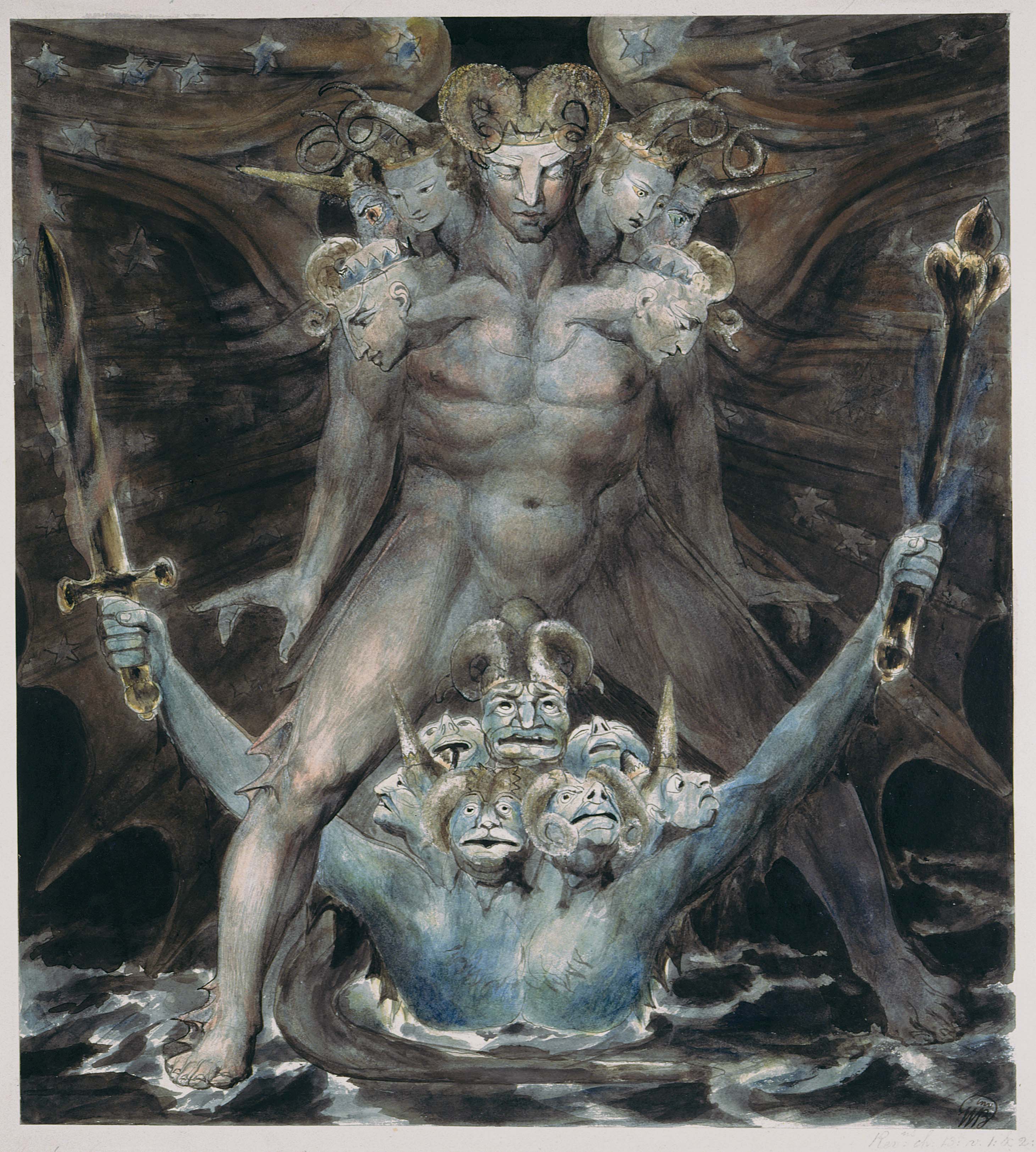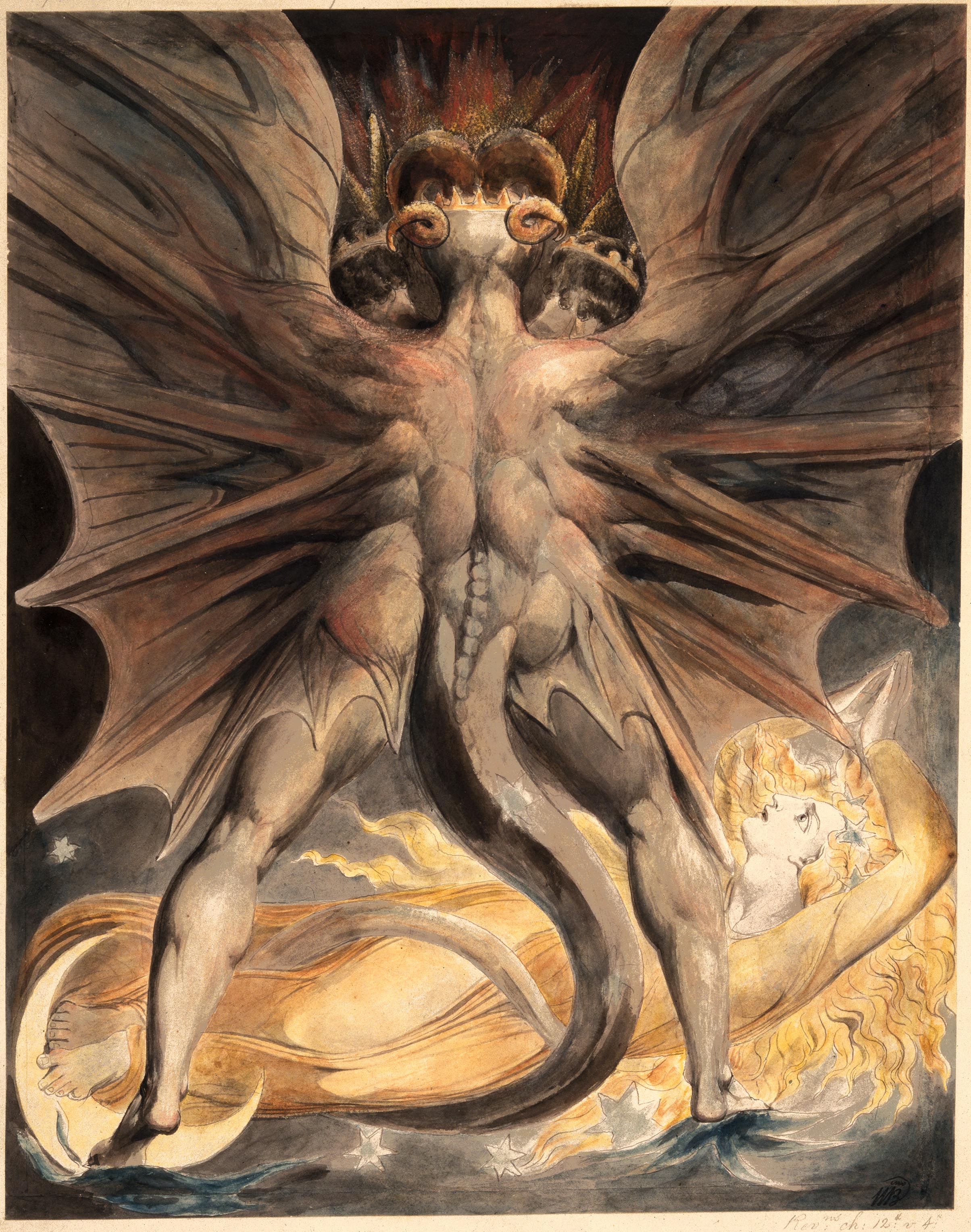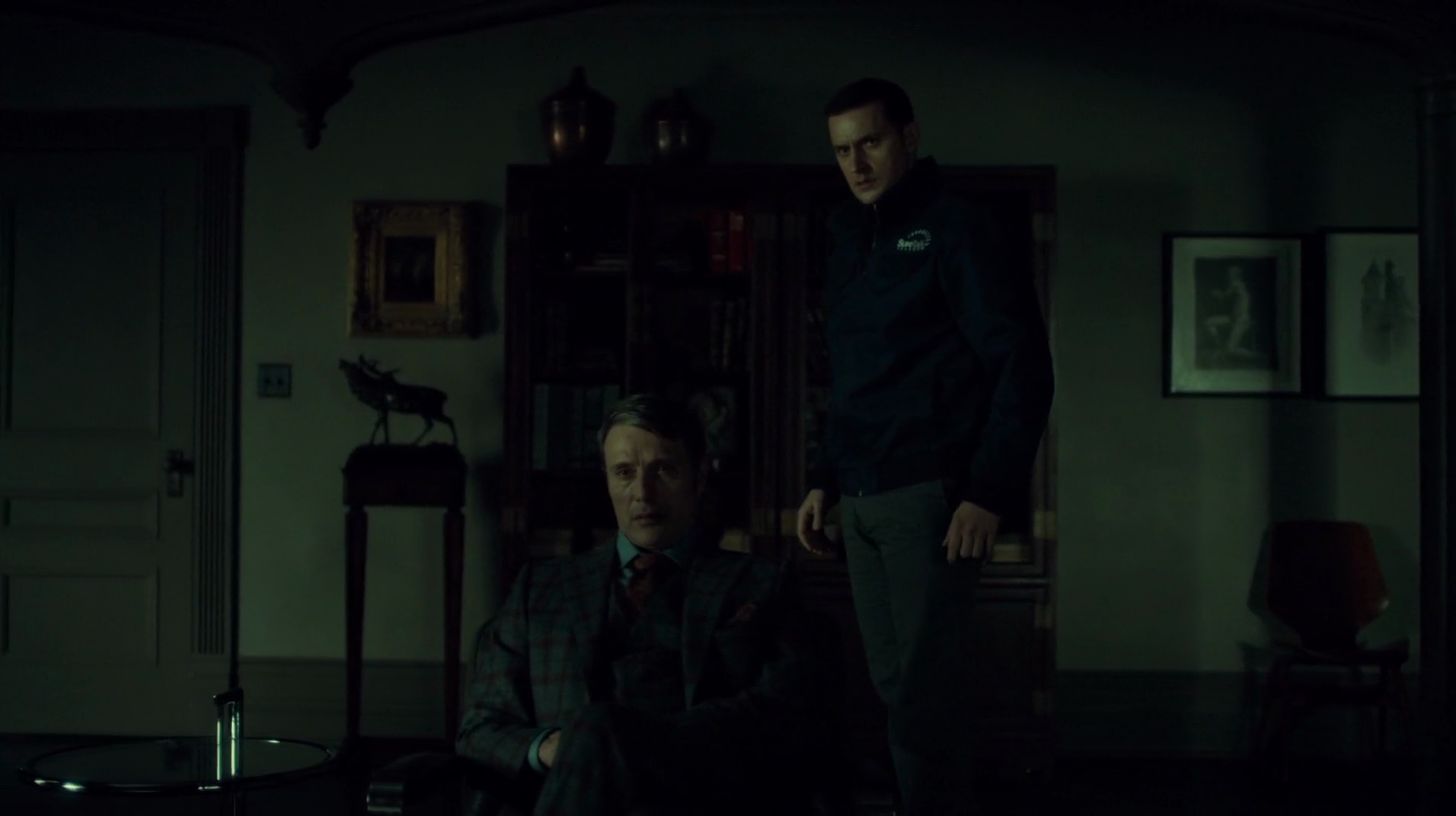The Proverbs of Hell 37/39: And the Beast from the Sea
 AND THE BEAST FROM THE SEA: The one painting in the series not to have a direct representation or invocation in the series. The tense sexuality that exists between the Dragon and the Sun-Clothed Woman is replaced here by a raw homoeroticism—a theme that is not entirely uncommon in Blake. (c.f. Object 47 of Milton a Poem) The Beast from the Sea appears in Revelation 13, one verse after the Dragon, and is said to be given his power by the Dragon, creating a sense of heritage or supplanting. In Blake, the Beast rises below the Dragon, but has clear dominion over him. Of course, that’s always how supplantation begins.
AND THE BEAST FROM THE SEA: The one painting in the series not to have a direct representation or invocation in the series. The tense sexuality that exists between the Dragon and the Sun-Clothed Woman is replaced here by a raw homoeroticism—a theme that is not entirely uncommon in Blake. (c.f. Object 47 of Milton a Poem) The Beast from the Sea appears in Revelation 13, one verse after the Dragon, and is said to be given his power by the Dragon, creating a sense of heritage or supplanting. In Blake, the Beast rises below the Dragon, but has clear dominion over him. Of course, that’s always how supplantation begins.
ALANA BLOOM: Maybe he’s trying to stop.
JACK CRAWFORD: You think there’s any way to push him to be self-destructive?
ALANA BLOOM: Push him toward suicide?
JACK CRAWFORD: Suicide suits me just fine.
WILL GRAHAM: If he’s really trying to stop, he’s not going to kill himself. How could he be sure his death would affect whatever’s inside him?
Will’s casual apprehension of the absurd logic of Dolarhyde’s difficulties in confronting the beast within is grimly funny. A crucial question, of course, is whether or not it would. Indeed, the metaphysical legitimacy of the Red Dragon is a point of considerable ambiguity here in a way that it simply isn’t in any other adaptation. Ultimately (and in contrast to Hannibal) the show suggests that Dolarhyde is not actually supernatural (the Dragon, notably, does not appear to survive his death), but it’s notable that Hannibal asserts his sanity towards the end of “And the Woman Clothed in Sun.”
HANNIBAL: This new twoness with the Dragon, it’s disorienting for you.
FRANCIS DOLARHYDE: The Dragon never spoke to me before. It was frightening.
HANNIBAL: What did it say?
FRANCIS DOLARHYDE: It called my name. It wants her.
HANNIBAL: If it weren’t for the power of your Becoming, if it weren’t for the Dragon, you could’ve never had her.
FRANCIS DOLARHYDE: I put my hand on her beating heart. Heard the sound of her living voice. A living woman. How bizarre.
There is a dash of incel to Dolarhyde, although this is firmly segregated from his motivation for murder. Nevertheless, his clear sense of himself as someone it is “bizarre” to imagine touching “a living woman” positions him clearly adjacent to a certain and timely vision of toxic masculinity.
FRANCIS DOLARHYDE: Will Graham interests me. Odd-looking for an investigator. Not very handsome, but purposeful.
HANNIBAL: He has a family. Save yourself. Kill them all.
It was of course inevitable that Hannibal would do this. It’s a detail from the book, but in terms of this Hannibal it’s also a functionally inevitable consequence of his declaration that Will is family in “And the Woman Clothed With the Sun.” Indeed, there’s a real sense in which the entire Abigail Hobbs plot exists to recast this action, a long and expanding context for this exact moment. Despite that, however, it was moved from being the cliffhanger of “And the Woman Clothed in Sun” to being part of the same episode as the actual attack on Will’s family, a move that downplays the moment’s importance by reducing the amount of time audience affect is expended fretting about Molly from a week to about thirty minutes. …


 How do you do fellow kids?
How do you do fellow kids? AND THE WOMAN CLOTHED IN SUN: The big one. Hannibal describes its “unique and nightmarish charge of demonic sexuality,” which is fair enough, but seems desperately insufficient. Let’s add, then, a brief discussion of gaze. As John Berger memorably simplifies it, in art the norm is that “men look at women. Women watch themselves being looked at.” Which at least broadly describes this picture, sure, in that we are seeing a woman being looked at. But the woman is obscured in the picture. We watch her being looked at, yes, but we do not really see her ourselves. That picture is The Great Red Dragon and the Woman Clothed With the Sun. Here the object of our gaze is, as they say, dat ass. This isn’t so much a charge of demonic sexuality as a stunningly homoerotic vision of erotic puissance. Dolarhyde, clearly, does not miss the point nearly so much.
AND THE WOMAN CLOTHED IN SUN: The big one. Hannibal describes its “unique and nightmarish charge of demonic sexuality,” which is fair enough, but seems desperately insufficient. Let’s add, then, a brief discussion of gaze. As John Berger memorably simplifies it, in art the norm is that “men look at women. Women watch themselves being looked at.” Which at least broadly describes this picture, sure, in that we are seeing a woman being looked at. But the woman is obscured in the picture. We watch her being looked at, yes, but we do not really see her ourselves. That picture is The Great Red Dragon and the Woman Clothed With the Sun. Here the object of our gaze is, as they say, dat ass. This isn’t so much a charge of demonic sexuality as a stunningly homoerotic vision of erotic puissance. Dolarhyde, clearly, does not miss the point nearly so much.
 Let’s be cheeky and try to understand something about the Austrian School using the ideas of the Frankfurt School. The two are, in any case, now permanently locked-together in a Reichenbachian struggle. At least, the bastard ideological descendants of the Austrian School seem to imagine this. For some reason. So fuck it, let’s ignore the fact that this is actually a delusional notion (at least as it is generally meant), and see what happens when they actually fight.
Let’s be cheeky and try to understand something about the Austrian School using the ideas of the Frankfurt School. The two are, in any case, now permanently locked-together in a Reichenbachian struggle. At least, the bastard ideological descendants of the Austrian School seem to imagine this. For some reason. So fuck it, let’s ignore the fact that this is actually a delusional notion (at least as it is generally meant), and see what happens when they actually fight.